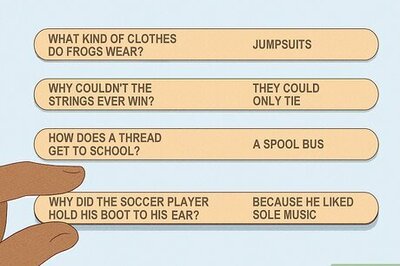
views
Cairo: Syria has agreed to pull its military out of cities, release prisoners and hold talks with the opposition as part of an Arab plan to end violence triggered by an uprising against President Bashar al Assad.
"We are happy to have reached this agreement and we will be even happier when it is implemented immediately," Qatari Prime Minister Sheikh Hamad bin Jassim al-Thani said after Arab foreign ministers met over the plan in Cairo.
Assad has deployed his army and security forces to crush protests inspired by uprisings elsewhere in the Arab world. He has said they are battling Islamist militants and armed gangs.
The United Nations says 3,000 people have been killed in the bloodshed.
Outside the Arab League's Cairo headquarters, a group of protesters chanted "No dialogue, leave Bashar" and "What shame, peaceful protests and he shoots at them". Syria's opposition have dismissed Assad's offer of dialogue as insincere.
The United States reiterated its call for the Syrian president to quit despite the League announcement.
"Our position remains that President Assad has lost his legitimacy to rule and should step down," White House spokesman Jay Carney told reporters.
Sheikh Hamad, whose country has led the committee which drew up the plan, said Syria had a agreed to the points including a complete halt to violence, the release of prisoners, removing the military presence from cities and residential areas and allowing the Arab League and media access to report.
The Qatari told a news conference the League would continue contacts between the Syrian government and the opposition "in preparation for a national dialogue within two weeks."
A League statement said: "The Arab committee (overseeing the plan) is responsible for submitting periodic reports to the ministerial council of the Arab League on the progress of carrying out the plan."
An Arab source, speaking on condition of anonymity, had earlier said Syria broadly agreed to the initiative, but wanted to discuss the location for holding a national dialogue and the mechanism for the League to monitor the situation.
Arab League Secretary-General Nabil Elaraby told Al Arabiya in a telephone interview that the talks between the Syrian government and the opposition would be held in Cairo.
Activists said on Wednesday at least 11 people were killed by security forces in and around Homs in central Syria.
"The regime is trying to buy time. Its calls for reform and dialogue are false and deceiving. The (Syrian) National Council reaffirms its demands that it had submitted to the Arab League," the opposition council said before the League statement.
The council said it wanted the League to take steps that included suspending Syria from the pan-Arab body and ensuring international protection for civilians, with Arab backing.
Arabs took such measures during an uprising in Libya against the rule of Muammar Gaddafi now ousted and killed. The League's backing for a no-fly zone over Libya led to a UN Security Council resolution that, in turn, prompted a NATO air campaign.
But the Arab League has stopped short of suspending Syria. Arab diplomats, cited by the Egypt's official news agency, said that would not happen at Wednesday's meeting. It said the focus would be on Syria's response to the Arab plan.
Citing the diplomats, the agency said it was "not possible under any circumstances to repeat the Libyan model in Syria". NATO has also ruled out any such military intervention in Syria.
"The Syrian people have decided: the regime must go. So there can be no dialogue that doesn't involve the regime leaving. A murderous regime cannot be accepted," prominent opposition figure and former judge Haitham Maleh told Reuters.
"The Arab League didn't ask the opposition or the people on the ground their opinion on the issue or the agreement that is taking place," he said, speaking in the United Arab Emirates shortly before the deal was announced.
The United States, which has imposed sanctions on Syria's oil industry and key state businesses in response to Assad's crackdown, had said before Wednesday's meeting that it would be "very welcome" if Syria accepted and implemented the plan.
But State Department spokeswoman Victoria Nuland said this week: "We have had a lot of promises of reform and only violence in terms of the action that we have seen from the Assad regime."
Syrian activists said security forces shot dead at least 11 villagers they had stopped at a roadblock near Homs.
A YouTube video distributed by anti-Assad activists purportedly showed several bodies, gagged and with their hands tied behind their backs. Another five were killed in Homs. All 11 were Sunnis, who form the majority of Syria's population.
Their killing follows reports by an activist in Homs, and on social network pages of Assad supporters, that nine members of the president's minority Alawite sect had been dragged from a bus and killed by gunmen near Homs on Tuesday.
Syrian state television showed tens of thousands of people rallying in Syria's eastern city of Raqqa, in the latest in a series of state-organised rallies designed to show Assad enjoys popular support nationwide. Similar demonstrations have taken place in Damascus, Aleppo, Latakia and Deir al-Zor.
With tight Syrian media restrictions in place, it is hard to verify accounts of violence or gauge the real levels of popular support for Assad and those demanding his removal.


















Comments
0 comment